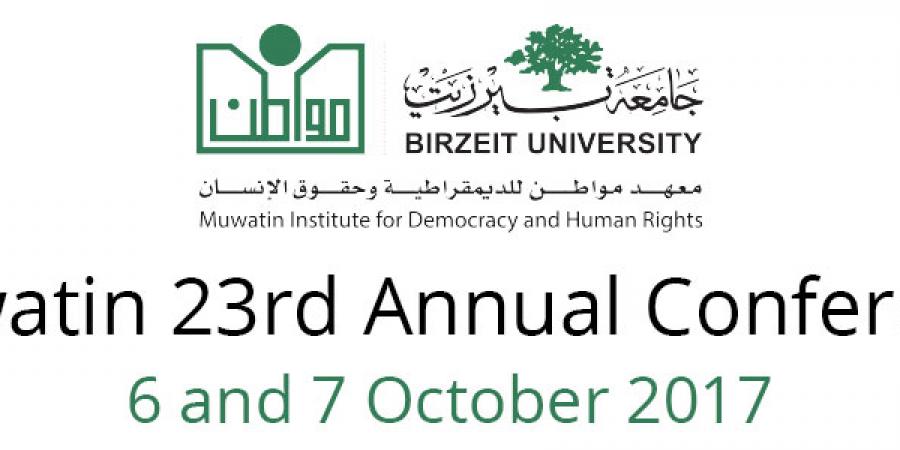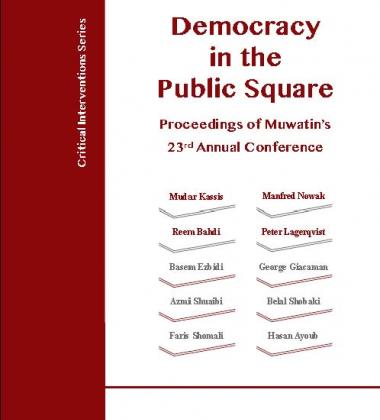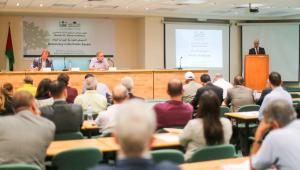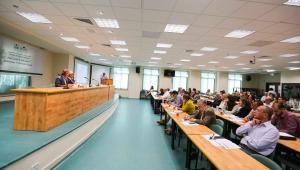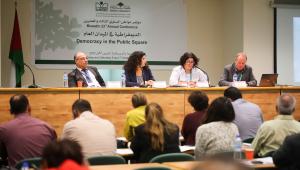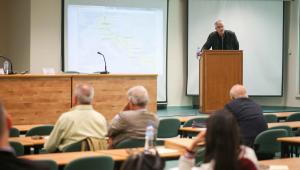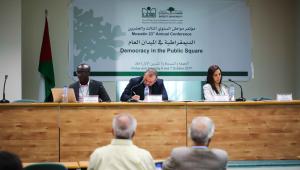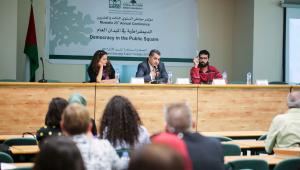“Democracy in the Public Square”
6 and 7 October 2017
Muwatin 23rd Annual Conference will focus on the deformations of democracy as a concept and in practice from a Palestinian perspective as well as from a global one. It will attempt to shed light on the global transformations on the understanding and practice of democracy (in its various forms and definitions), to the extent that it eventually derailed from being an expression of the public will. The conference aims at reinstating the concept of democracy in the everyday and in the public sphere to its focal position in the debate on democratic development in Palestine and globally. It also aims to place the essential discussion of democracy on the Palestinian agenda in the context of Palestinian developmental needs, as well as to foster the efforts to make the executive accountable, persuade it to be more responsive to the demands of the Palestinian society, and empower the general public in addition to specific groups to be part of the reform process and agenda setting.
The prevailing the discourse on the Palestinian question has been reduced over the years to questions about the political authorities’ nature and structures, leaving aside the whole range of popular politics, i.e. the organization of the public sphere and the daily lives of Palestinians. One of the manifestations of this reductionism is the centrality of the questions concerning state building, final status issues, institution building, and the like. In other words there is a singular question about political power(s), but no questions about the eventual and original goal of this political power – individual and collective self-determination, that requires the organization of the public sphere and, hence the questions about the political power.
There are multiple, but interconnected drivers to this reductionism. Not the least of these drivers is the nature and setup of the peace process including its various “stages” -Madrid, Washington, Oslo, and the post Oslo negotiations. Another driver is the prevailing interest in development aid driven discussions, and other policy oriented debates on political questions that were (re)shaped as part of the neoliberal shaping of the current, problematic, world order.
As far as the Palestinian question is concerned, the reduction of the question of democracy to the question of political power corresponds to the reduction of the question of occupation to the questions about its forms and manifestations (another expression of excluding the society from the political realm), and to the fragmentation of the original question to issues of management / governance in various fields (usually referred to as the final status issues) that do not include the central question of self-determination except as formality or a lip service. The discussion of the core issues is, thus, reduced to the discussion of the modes and mandates of its management with no reference to the public view.
The tendency to reduce political questions to questions of authority, obviously cannot efficiently serve the achievement of enhancements to peoples’ lives, benefit their freedom, nor facilitate the realization of their self-determination, which are assumed to be the ultimate goals of political organization.
The questions of democracy in this framework also got reduced to questions about the political form and procedure, leaving aside substantial questions of participation and the realization of the free will of individuals and groups.
The political debates arising in this context of wide spread reductionism become futile and dichotomist: one or two states? Fateh or Hamas? Independent state or (Con)Federation? Negotiations or Intifada? The positions around these questions are discussed in terms of a certain realpolitik dismissing vital questions regarding the main postulations concerning the nature of the problem to be resolved. Even the political practice of elections ends up with a “majority” as a result of passive participation.
1. Democracy in the Public Square
While the substance of democracy is about the realization of the public will, and while various countries (including Palestine) have introduced various tools, regulations, and procedures (legal and constitutional reforms, human rights protection bodies, anti-corruption measures, judicial reforms, and electoral systems, etc...) for the realization of this will there seems to be diminishing room (public space) for expressing, and practicing the public will.
Several relatively recent developments (that are of global nature) might have jointly resulted in this syndrome (or at least made it more acute): The nature of neoliberal transformations that manifest themselves in the commoditization (or the actual privatization) of the public space (e.g. corporate sponsorship of public events); the new security doctrine that rendered privacy meaningless through the privatization of public services (e.g. private companies collect private information as a condition for the rendering of vital services) and the resulting vagueness of boarders between the private and the public (e.g. type of private information available to banks); the new communication technology where one can imagine the emergence of new spheres other than the public and the private like the public private (i.e. publicly available private information – e.g. your geographic location via GIS services on a smart phone) and the private public (i.e. the private monopolization of public resources – e.g. the use of GIS information for marketing); the change in the nature of the governance that does not presuppose the investment in the public good at the level of the state (e.g. diminishing financing of higher education), and at the level of local government (e.g. urban planning is now based on the assumption that someone has to pay for every facility or service provided); and many more manifestations.
The Global question
The question that arises here is what kind of substantial decisions can the citizen make if choices are limited to choosing between commodities on the market? And if the rationale of the neoliberal scheme is acceptable, a question arises about the need of the political system altogether. In other words, if the political system has no independence from the market, why does a system of corporate governance for communal life not suffice instead of its political organization? In this case individuals will become citizens of corporations instead of cities and states – and can then show at the airport a Microsoft passport, for example, instead of an Indian passport!
The Palestinian Question
While the dangers of these changes on the nature of citizenship are global, they are of extreme sensitivity in Palestine, which has a higher degree of “exposure”, at least for three reasons: (a) the fact that Palestine is still in the process of formation of both its political system and its economy (including its market), the current trends of governance will lead to an unbalanced development of the governance framework that might be inhumane; (b) the dependence of the political and economic systems in Palestine on foreign intervention (both economic aid and the dependency of the political system on external factors) means a greater vulnerability to neoliberal transformations; and (c) the lack of an existing status quo of citizenship (a citizenship tradition)
means that there are no “conservative” moderation techniques that can act as a balancing factor for these processes.
In addition, these circumstances impact the nature of political movements and the process of national liberation. If the above mentioned dynamics mean that there is not much room for the nation state, then there is a major question about the fate of national liberation.
There are many indicators to the fact that the above mentioned transformations became part of the national liberation discourse since the early 90’s. What might have been an unspoken part of the design of the peace process since the early 90s, will now become common knowledge that will create new, probably unprecedented, dynamics of perceived political change, and the emergence of new trends and forms of resistance. The more these trends become entrenched in the daily life of Palestinians, the more likely is the inverse impact on the achievement of peace and self-determination in the manner that has thus far been traditionally perceived.
In view of this, it is indispensable to examine the type of intervention that can lead to a democratic transition that is not doomed. A transition that does not only promote an idea and an ideal, but one that can guarantee the sustainability of the existence of the democratic object: the public nature of democracy! In Palestine this object is yet to be shaped and not only protected.
2. Conference Rubrics
The foreseen conference will examine, inter alia:
-
The reality and prospects of democracy globally and locally, including the impact of the deterioration of the current world order, the development of tribal trends, identitarianism, securitization, and the increasing discussions on global justice based on the premise that current problems do not have solutions at the level of a single state.
-
The impossibility of building a sovereign political democracy under occupation, but the possibility of preparing the ground for it in the national liberation era, and shaping the national agenda in a manner that facilitates national liberation and social emancipation simultaneously.
-
The Palestinian state-building project with social components like healthcare, education, social security, the role of the security sector, judicial performance, and taxation schemes in a manner that fosters the steadfastness of Palestinians on their land – the strategic asset to counteract the Zionist project in Palestine.
-
The nature of Palestinian local government through the discussion of such aspects as urban planning, water management, environmental issues, privatization of municipal services (in general: what should and what should not be privatized), and their relation to social democracy and decision making processes.
-
The nature and role of the Palestinian civil society through the discussion of such aspects as civil society agendas, representation, coalitions, forms of organization and action, and the means to rebuild organizations with a wide popular base, such as unions, political parties, and commissions, which are traditionally the drivers of change.

